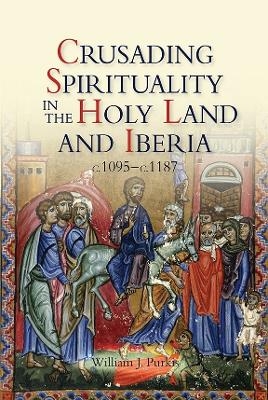
Crusading Spirituality in the Holy Land and Iberia, c.1095-c.1187
Seiten
2014
The Boydell Press (Verlag)
978-1-84383-926-2 (ISBN)
The Boydell Press (Verlag)
978-1-84383-926-2 (ISBN)
Argues for a new context for the origins and development of crusading, as an imitation of Christ.
For much of the twelfth century the ideals and activities of crusaders were often described in language more normally associated with a monastic rather than a military vocation; like those who took religious vows, crusaders were repeatedly depicted as being driven by a desire to imitate Christ and to live according to the values of the primitive Church.
This book argues that the significance of these descriptions has yet to be fully appreciated, and suggests that the origins and early development of crusading should be studied within the context of the "reformation" of professed religious life in the twelfth century, whose leading figures (such as St Bernard of Clairvaux) advocated the pursuit of devotional undertakings modelled on the lives of Christ and his apostles. It also considers topics such as the importance of pilgrimage to early crusading ideology and the relationship between the spiritualityof crusading and the activities of the Military Orders, offering a revisionist assessment of how crusading ideas adapted and evolved when introduced to the Iberian peninsula in c.1120. In so doing, the book situates crusading within a broader context of changes in the religious culture of the medieval West.
Dr WILLIAM PURKIS is Senior Lecturer in Medieval History at the University of Birmingham.
For much of the twelfth century the ideals and activities of crusaders were often described in language more normally associated with a monastic rather than a military vocation; like those who took religious vows, crusaders were repeatedly depicted as being driven by a desire to imitate Christ and to live according to the values of the primitive Church.
This book argues that the significance of these descriptions has yet to be fully appreciated, and suggests that the origins and early development of crusading should be studied within the context of the "reformation" of professed religious life in the twelfth century, whose leading figures (such as St Bernard of Clairvaux) advocated the pursuit of devotional undertakings modelled on the lives of Christ and his apostles. It also considers topics such as the importance of pilgrimage to early crusading ideology and the relationship between the spiritualityof crusading and the activities of the Military Orders, offering a revisionist assessment of how crusading ideas adapted and evolved when introduced to the Iberian peninsula in c.1120. In so doing, the book situates crusading within a broader context of changes in the religious culture of the medieval West.
Dr WILLIAM PURKIS is Senior Lecturer in Medieval History at the University of Birmingham.
Introduction
The Monastic Response to the First Crusade
The Foundations of Crusading Spirituality, 1095-c.1100
Pilgrimage, Mimesis and the Holy Land, 1099-c.1149
The Cistercian Influence on Crusading Spirituality, c.1128-1187
The Introduction of Crusading to Iberia, 1095-c.1134
The Development of Crusading Spirituality in Iberia, c.1130-c.1150
Conclusion
Bibliography
Index
| Erscheint lt. Verlag | 21.8.2014 |
|---|---|
| Zusatzinfo | 1 line illus. |
| Verlagsort | Woodbridge |
| Sprache | englisch |
| Maße | 156 x 234 mm |
| Themenwelt | Geschichte ► Allgemeine Geschichte ► Mittelalter |
| Geschichte ► Teilgebiete der Geschichte ► Militärgeschichte | |
| Geschichte ► Teilgebiete der Geschichte ► Religionsgeschichte | |
| ISBN-10 | 1-84383-926-1 / 1843839261 |
| ISBN-13 | 978-1-84383-926-2 / 9781843839262 |
| Zustand | Neuware |
| Haben Sie eine Frage zum Produkt? |
Mehr entdecken
aus dem Bereich
aus dem Bereich
eine neue Geschichte des Mittelalters
Buch | Hardcover (2023)
C.H.Beck (Verlag)
CHF 53,20


